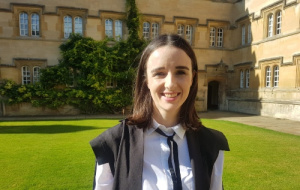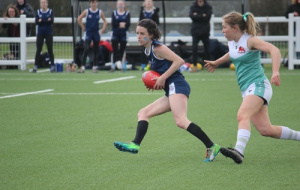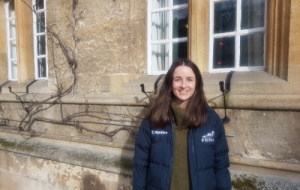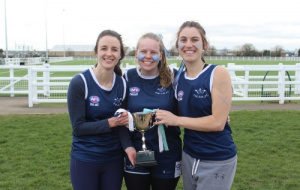Profile: Dr Beth Hamilton

(2018, DPhil Population Health)
Beth completed a Doctor of Medicine with First Class Honours and received a University Medal at Griffith University in 2016. She did a Masters in Global Health Science and Epidemiology last year as a Rhodes Scholar at Oxford. She was previously a Director of Ubuntu Through Health, delivering aid projects in South Africa, Ghana, Kenya and East Timor.
Why did you decide to do a DPhil?
I am a junior doctor and am ultimately interested in working in a public health related field, where change can trickle down and impact the lives of many people in a meaningful and sustainable way, and hopefully serve to reduce inequality.
I completed a Masters in Global Health Science and Epidemiology last year, which provided a foundation in understanding the epidemiology and global burden of disease, as well as being able to appraise and perform research in this field. This presented the option of pursuing further study in the form of a DPhil in Population Health. I thought this would be an invaluable opportunity to continue building an epidemiological and statistical skillset using real-world data, to better understand patterns of disease and the various factors that impact this, to ultimately understand how to better prevent disease, identify and target high risk groups and treat disease.
Give your specialist research area elevator pitch.
I am looking at the pattern and burden of Hepatitis B infection in the China Kadoorie Biobank. The China Kadoorie Biobank is a study of half a million Chinese adults, including information on various biomedical, social and economic factors that may impact their risk of disease. In the back half of the DPhil, I hope to look at host genetic factors affecting Hepatitis B infection. Hepatitis B infection is a very important health issue in China, causing high rates of liver failure, liver cancer and related deaths.
 Do you think you have changed since coming Oxford?
Do you think you have changed since coming Oxford?
Yes, definitely. Coming to Oxford has opened up my eyes to the various pursuits those around me are studying and learning about, and to the wide range of paths people can take to make an impact or lead what they see as a “good” or meaningful life. I am very aware of the privileged position I am in being here studying in Oxford, and having the time and opportunity to ponder such questions and discuss this with others. I have grown more resilient- moving from the fairly structured pathway that I commenced as a junior doctor, where I felt I belonged, to the other side of the world to study again, has had its challenges and made me revisit my identity (which has been very much intertwined with medicine for most of my adulthood).
What do you enjoy doing in your free time (and what is Australian Football?!)?
I enjoy drinking copious amounts of coffee, reading, walking around Port Meadow and admiring dogs, and playing sport. Australian football is Australia’s football league (Youtube it!)- nothing like what you are imagining. I got roped into playing upon arriving in Oxford, and this year captained the women’s side. We just won our Varsity match against Cambridge, which is the first time Oxford women have won! This year I have also started triathlon and I have enjoyed being able to cycle out around the beautiful English countryside.
 What is the greatest challenge you have faced?
What is the greatest challenge you have faced?
A personal challenge would be dealing with personal mental health issues. I am still in the process of overcoming this and don’t think I will “necessarily” overcome them, but I am learning to live with this. Being open, talking to people and asking for help has been integral to process. In a professional sense, I found the most rewarding clinical rotation I have done thus far (haematology), also the most challenging. I formed relationships with patients and their families over a series of months, and found confronting “poor” outcomes and death in the context really challenging. I found myself questioning the role we play as doctors, the role medicine plays in extending life and/or improving quality of life, the limits of medicine and myself as a junior doctor, and what makes life meaningful. I finally read Atul Gawande’s Being Mortal recently, and I really resonated with a lot of his discussion around the disconnect between what people value in their life and the constructs and goals of medical care they are subject to as patients.
 What is your proudest achievement?
What is your proudest achievement?
My proudest achievement is being awarded the Rhodes scholarship to come and study in Oxford. I remember visiting Oxford several years before commencing study here and thinking how unreachable this place was and that it would only every be confined to my dreams. Going the process of applying for the Rhodes scholarship required me to really reflect on how I wanted to make an impact, what being a doctor meant to me, and how further study could help me achieve my dreams. It required a great deal of vulnerability and believing in myself, and I was proud that (with much support from mentors, friends and family) I managed to go through with the application process.
Describe Univ in three words.
Warm, diverse, accepting.
Published: 4 May 2020
